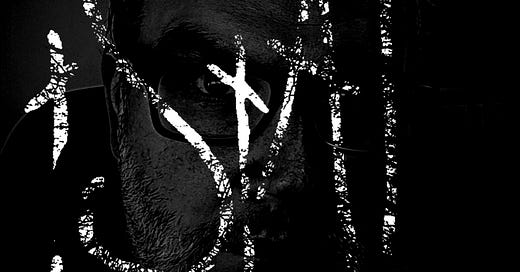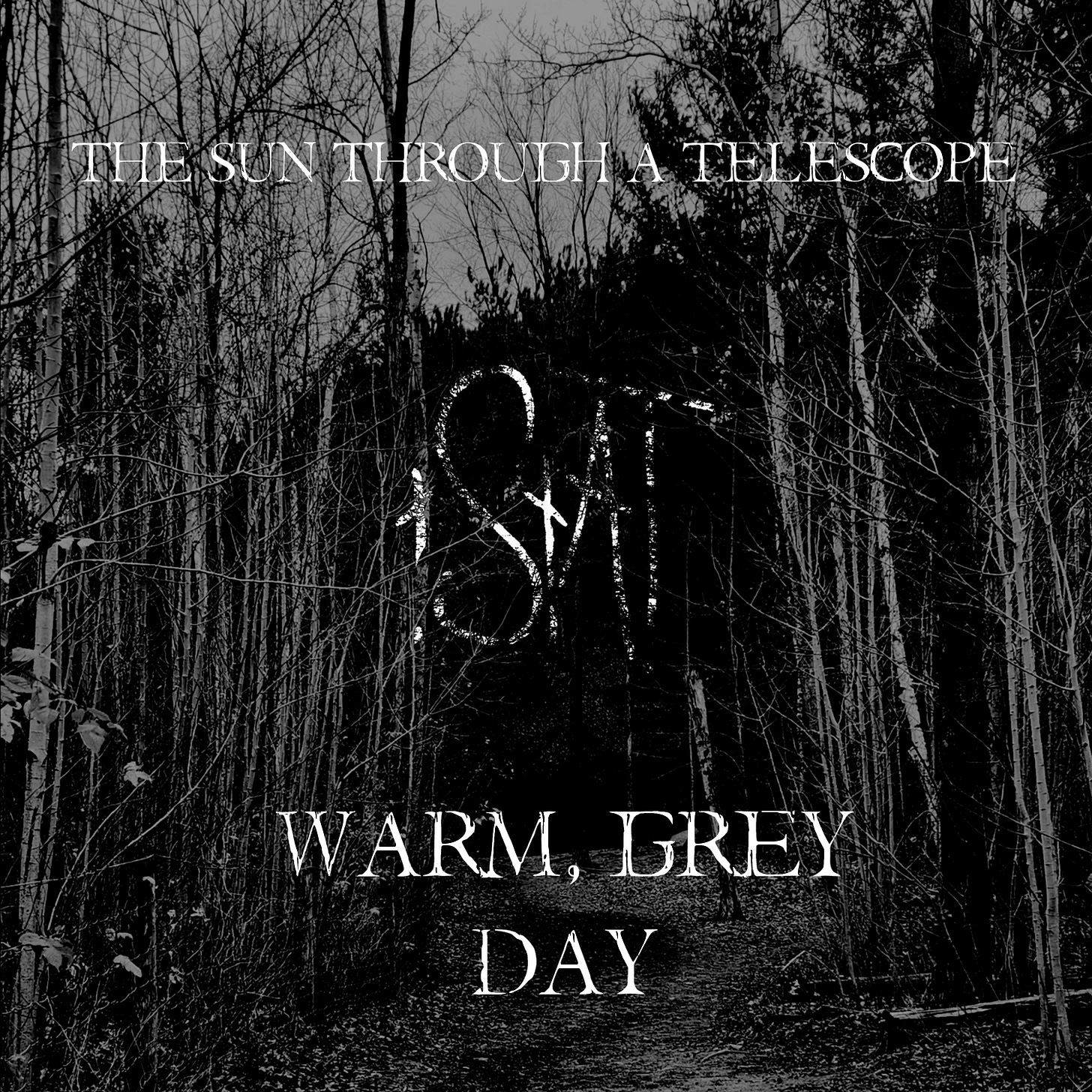BAND OF THE WEEK: The Sun Through A Telescope
One-person drone/doom so massively enveloping that it sounds like it's being played by an army (of darkness, obviously).
Don’t look at the sun through a telescope, okay? You can google about it if you don’t know, but yeah, bad things will happen to you. Just like they happen in your brain when you’re listening to The Sun Through A Telescope’s music, but in this case I highly encourage you to still go for it. You won’t go blind or anything, but it’s not feel-good music, let’s put it this way. Never been, really - I was lucky to discover this Canadian one-man project really early on and have even talked about some of their earlier releases in some of the past blogs that I wrote for (funny story - I got in touch with TSTAT more or less around the same time as I also discovered and also got in touch with another brilliant one-man project, The Sun Came Up Upon The Left, and I confess I mixed their names up a couple of times in the beginning and always had to double check I was mentioning the right one), and it’s been fantastic to witness the evolution. A product of Leigh Newton’s (aka Lee Neutron) twisted creative mind, TSTAT has ridden on the edge of several styles ever since those early colour-titled EPs (‘Green/Black’ and ‘Orange’) came into being, always associated with doom and drone but always just a little bit more than that. Leigh is a master at creating atmosphere regardless of what genre is the most dominating one at any point in the songs, and you can go from rage to melancholy to apathy to contemplation within the space of just a few minutes, all with a very natural flow. The last releases from the project had been a 2020 full-length called ‘Fading Sun’ and a 2022 EP called ‘Chasm’, but yesterday Leigh decided to drop a brand new album by surprise, ‘Warm, Grey Day’, and it’s quite a monument to digest.
Fortunately Leigh was kind enough to give me a little heads up, so I can present this new release to you guys in a timely fashion, because this isn’t the kind of music that you listen to once and start spouting opinions straight away, though it is actually surprisingly more accessible than most past material, with a remarkable production that highlights the soaringly melodic, clean-vocaled parts that make up the most of it. In a way, it’s one of TSTAT’s records that most fits the proper doom metal tag, albeit in an oblique, Pallbearer kind of way, but as always there’s constant deviations that keep you constantly guessing. Leigh has played in both thrash and grind bands (World War 4, Fuck The Facts) and also done more explicitly dark ambient stuff (the awesome Merdarahta), so he always knows how extract the best from each style and vibe. From subtle electronic noises in the background filling up space and adding tension to some absolutely raging sections - check out that full-on black metal opening of ‘The Mercy’, which then dilutes into slightly uneasy pastoral peace -, you never really know what’s coming. Just like wandering those woods on the album cover on a warm, grey day, and you can either bump into a fairy that’ll grant you a wish or into a cave troll that will eat your legs raw, that’s this record’s full experience for you. Go for it. Hey, why not use it as soundtrack as you read the great interview that Leigh granted us, right after the jump.
You can find The Sun Through A Telescope on Bandcamp, Facebook and Spotify.
‘Warm, Grey Day’ is now out through the band’s Bandcamp.
“Your newest release should ideally make the one prior sound like shit. That’s a good sign!”
- Leigh Newton
It’s been really cool to accompany your trajectory with TSTAT from the very beginning, I feel very lucky to have discovered the project so early. Do you remember the days when you created it, what were you aiming for?
Leigh Newton: Thanks José! I really appreciate your support over the years! I remember coming up with the initial concept for The Sun Through a Telescope as far back as 2007 – a solo project that would be specifically metal but also involve many other elements (ambient music being the other main element). It was mainly born out of frustration with the general inactivity of the bands I was playing in at the time. The idea was that I could create whatever kind of music I wanted at whatever pace I set for myself.
Did you plan, or at least envision, that it would be an entity that would last this long? Since it’s only you, do you feel it’s kinda tied to your own musical personality, is it something that you’re going to maintain in one form or another as long as you’ll play music, do you think?
Leigh: I think you pretty much nailed it. It is probably the most accurate representation of my musical personality (or psyche or subconscious – whatever works). And yes, since TSTAT has already had a longer lifespan than just about any other band I’ve played in, it will most likely be the musical project that I’ll remain tied to until... the end! The musical direction will almost certainly evolve into exclusively ambient and/or spoken word releases as I get too old and frail to pick up a guitar or even get near a drumkit.
What changes can you pinpoint that you’ve made throughout the years to TSTAT? Be it in approach, influences or even gear and other more practical matters, do you do things in a substantially different way today than what you did almost 15 years ago (man, we’re getting old)?
Leigh: Yes!!! Getting old and feeling old, ha! My approach these days – to writing, recording, mixing, etc – is vastly different than when I first started the TSTAT thing. A lot of it is just the natural course of improvement when it comes to recording your own stuff (I hope!). Acquiring new and better bits of gear helps too. The songwriting has come a long way as well. When I listen back to a lot of the older stuff, I’m constantly asking myself “What the hell was I thinking???”. I’m honestly not super into most of the material prior to ‘Fading Sun’, which would basically entail just about everything prior to 2020. But I think that’s good. Your newest release should ideally make the one prior sound like shit. That’s a good sign!
Let’s talk about ‘Warm, Grey Day’ then – what is at its origin? Do you write differently whether it’s for a full-length or an EP, or do you even know what it’s going to be when you’re writing the songs?
Leigh: The album title was the last thing that fell into place. It’s a lyric from the Monster Magnet song ‘Medicine’. I’m no huge fan of that band and my album has no real connection to them at all, musically or otherwise. But I do love their first album Spine of God which is where that tune comes from.
I knew this release was going to be a full-length and approached it as such. I had initially set out a template of six songs (I love the idea of full-length albums that are basically slightly longer EPs) but there were two songs that had so many different parts to them that I decided to split them into separate tracks, which upped the song count to 8. I didn’t really have anything specific in mind, other than a slightly more brutal version of ‘Fading Sun’, which leaned heavily on the “doomgaze” vibe. I had initially intended it to be a much uglier album with very little clean singing but it didn’t end up turning out that way.
What is your usual process for writing, do you have a set method or does it change often? What usually tickles your inspiration?
Leigh: Inspiration usually comes from hearing a certain part from a certain song (a vocal line, a guitar riff, etc) that, for whatever reason, will sink its teeth into my brain. I then make it my mission to rewrite that part into a TSTAT riff or part, ideally so that it’s not too much of a flagrant ripoff. For instance, the song ‘Fantastic Waste’ came from sections of the Robert Pollard song ‘A Girl Named Captain’. ‘Eyes Lambent’ is based very heavily on a Godflesh song. The working title for ‘Yellow Darkyard’ was ‘Slint’. There’s also a bassline near the end of ‘Yellow Darkyard’ that I definitely ripped from a Fuck the Facts song, although I didn’t realize it until way after the song was complete!
One particularly interesting influence that you have mentioned for this album are the Peel Sessions that you were listening to a lot, and how you wanted to capture the rawness of those sessions. What concrete steps did you take to go rawer, and is there any specific session (or a few) that you’d like to highlight as some of your favourites?
Leigh: Yeah, there’s something about those old Radio One and Peel Sessions that is so special. Probably that “live off the floor” quality where you can hear that it’s a band playing together with little to no overdubs. In particular, the Pink Floyd Radio One sessions that took place between 1969 and 1972 are all fantastic. In many cases, the songs they played in those sessions are far superior to the better known album versions! The Killing Joke and Napalm Death Peel Sessions are also huge favourites. As far as my approach, it involved starting with a slightly looser drum take than usual – not being so ridged and locked in, a little more “jammy”. That’s kind of all that was required to set the tone! Everything else fell into place accordingly. I definitely didn’t utilize that approach for every song on the album, just a select few.
Is there any sort of concept to the album? Would you like to talk about any kind of meaning that you are trying to convey with these songs?
Leigh: If there is any kind of theme on the album, as far as the lyrics go, it’s something you mentioned earlier – getting old! Basically, I’ll be turning 50 next year and that seems to be the thing that crops up the most in the lyrics this time around. My father passed away at a pretty young age (he was 56, I was 23) so I kind of feel the spectre of that, the closer I get to the age he was when he died. But for the most part, the lyrics are “cobbled together” with nothing very cohesive binding them together. During the time that I was writing the lyrics, I was playing a ton of Alan Wake 2, I had rewatched the first season of True Detective – those are a few things that ended up finding their way into the lyrics, maybe even just a line here and there. All very random and scattered.
But may I also say that I despise writing lyrics and I’m really not great at it. I see it as a means to an end, nothing more. For this album, typically what I’d do was have a few late Friday/Saturday night drinks, let whatever was in my head at the time spew out, and the next morning I’d check and see if there was anything worth keeping. Sometimes it was okay and sometimes it was on par with a 16-year old goth kid’s diary.
So, lyrics are very secondary for me but the vocals themselves are very important. What is being conveyed isn’t necessarily within the words but the melodies themselves, which means things are still emotional but much more abstract.
I don’t think you ever performed live with TSTAT, right? Is that something you would like to do someday?
Leigh: No, never performed live with TSTAT. It’s something I’ve been thinking about a lot lately and may actually try and make it happen this year. A couple of friends of mine (Gary and Deniz from the amazing band They Grieve) have offered to help out with bass and drums so I’ve at least got that part covered. We shall see.
Is Merdarahta still alive in any way, by the way? I really liked that one. I won’t even seriously ask about World War 4, but hey, does the thrasher in you ever feel the need to get out a bit more than the vaguely thrashier bits you occasionally have with TSTAT and go back to those days?
Leigh: I’ve actually been jamming with Blake aka Necro Burger from World War 4 on some pretty killer death metal riffs of his! Hopefully, something will come from that because it’s a lot of fun and yes, I really do love playing that kind of stuff! Hopefully I don’t have an aneurysm in the process.
It’s funny that you bring up Merdarahta! There is a pretty good chance that we will be doing something this year! Stay tuned!
Want an exclusive tote bag? Become an annual subscriber of TDM and we’ll send you one, free postage worldwide. Get on it:







